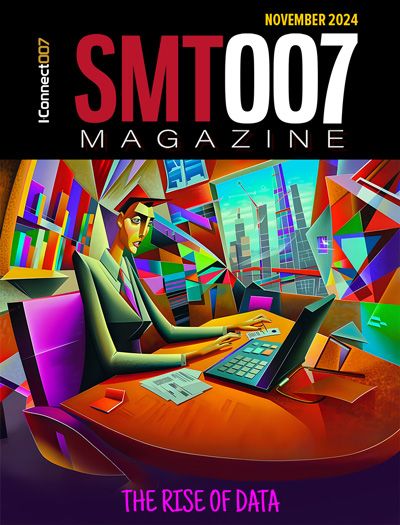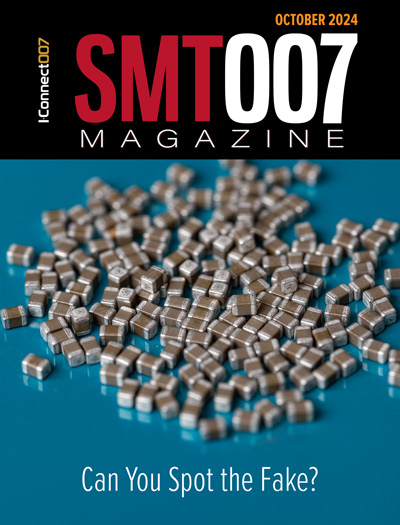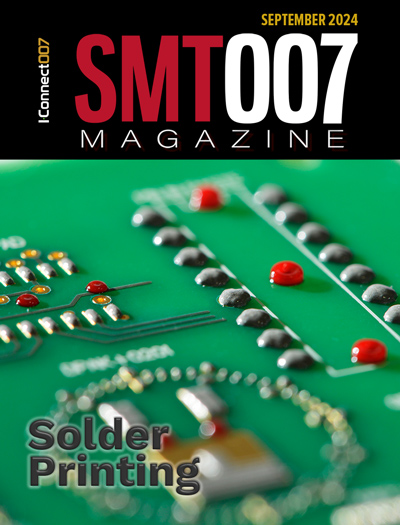-

- News
- Books
Featured Books
- smt007 Magazine
Latest Issues
Current Issue
The Rise of Data
Analytics is a given in this industry, but the threshold is changing. If you think you're too small to invest in analytics, you may need to reconsider. So how do you do analytics better? What are the new tools, and how do you get started?

Counterfeit Concerns
The distribution of counterfeit parts has become much more sophisticated in the past decade, and there's no reason to believe that trend is going to be stopping any time soon. What might crop up in the near future?

Solder Printing
In this issue, we turn a discerning eye to solder paste printing. As apertures shrink, and the requirement for multiple thicknesses of paste on the same board becomes more commonplace, consistently and accurately applying paste becomes ever more challenging.
- Articles
- Columns
Search Console
- Links
- Media kit
||| MENU - smt007 Magazine
U.S. Department of Labor Proposes New Wage and Overtime Regulations
August 6, 2015 | IPCEstimated reading time: 3 minutes
On June 30, the Department of Labor (DOL) proposed new wage and overtime regulations under the Fair Labor Standards Act (FLSA) and is seeking comments by September 4, 2015.
DOL proposes to raise the salary threshold for an employee to be exempt from minimum wage and overtime pay to be equal to the 40th percentile of earnings for all full-time salaried workers in the United States. In 2015, this would equate to $970 per week, or $50,440 annually. Under the current regulations, an executive, administrative, or professional employee must be paid at least $455 per week ($23,660 per year) in order to qualify for the exemption.
The Department is also proposing to include a mechanism to automatically update the salary and compensation thresholds on an annual basis using either a fixed percentile of wages or the Consumer Price Index for All Urban Consumers (CPI-U).
In the proposed rule, DOL also asks whether revisions to the “duties tests” are necessary in order to ensure that these tests fully reflect the purpose of the exemption.
On July 23, the U.S. House of Representatives Subcommittee on Workforce Protections held a hearing on the proposed rule. Issues raised during the hearing include a number of the concerns raised by IPC members (discussed below).
Industry Concerns
IPC Government Relations (GR) committee members highlighted the following concerns:
- The proposed threshold is too high for entry level purchasing, manufacturing, and engineering
- The salary threshold may be inappropriate for rural, southern, and low cost of living areas.
- The proposed threshold would raise costs and is a direct formula for exporting work to lower cost of living countries
Background
On March 13, 2014, President Obama signed a Presidential Memorandum directing the DOL to update the regulations specify which workers are exempted from the FLSA’s minimum wage and overtime regulation.
Since 1940, the regulations implementing exemption for executive and professional (EAP) or “white collar” workers have required each of three tests to be met for the exemption to apply: (1) The employee must be paid a predetermined and fixed salary that is not subject to reduction because of variations in the quality or quantity of work performed (the “salary basis test”); (2) the amount of salary paid must meet a minimum specified amount (the “salary level test”); and (3) the employee’s job duties must primarily involve executive, administrative, or professional duties as defined by the regulations (the “duties test”).
DOL believes that regularly updating the salary and compensation levels is the best method to ensure that these tests continue to provide an effective means of distinguishing between overtime-eligible employees and those who may be bona fide executive and professional (EAP) employees. DOL does not make specific proposals to modify the standard duties tests, but is seeking comments on whether the tests are working as intended to screen out employees who are not bona fide EAP employees. In particular, the DOL is concerned that, in some instances, the current tests may allow exemption of employees who are performing such a disproportionate amount of nonexempt work.
Action and Next Steps
IPC has joined the Partnership to Protect Workplace Opportunity, a broad coalition of concerned parties with very similar concerns to those expressed by IPC members. IPC may sign on to the partnership’s comments, or draft our own if our concerns differ significantly.
The partnership has requested an extension of the September 4 comment deadline in order to allow more robust data collection and time to review of the proposed rule.
Several coalition members testified at the July 23, 2015 Congressional hearing, and the partnership also submitted a statement for the record. The partnership will be launching a grassroots campaignshortly; IPC members may wish to participate in addition to submitting comments.
IPC members with questions, comments, or an interest in reviewing the draft comments, should contact Fern Abrams, IPC director of regulatory affairs and government relations.
Suggested Items
IPC Japan Puts More Focus on Collaboration, Standards Development, Advanced Packaging
11/26/2024 | Yusaku Kono, IPC Japan RepresentativeIn the past year, IPC has strengthened its relationships with key Japanese companies and government bodies. This was accomplished, in part, by a visit to Japan this past summer, where members of the IPC Asia team, punctuated by standards committee work last winter, forged stronger ties with government officials and companies involved in electronics manufacturing.
IPC Hall of Fame Spotlight Series: Highlighting Patty Goldman
11/22/2024 | Dan Feinberg, I-Connect007In my first article of this special series, I wrote a synopsis of the IPC Raymond E. Pritchard Hall of Fame (HOF) Award, along with a commentary on its first few members, particularly Pritchard. Over the years, IPC members who have contributed significantly to IPC and our industry have been awarded this high honor and recognition. Though many early HOF members have passed away and are unknown to today’s IPC membership, their contributions still resonate. Over the coming months, I look forward to researching and reporting on IPC Hall of Fame members and their contributions. This month, I highlight Patty Goldman.
Winners of IPC Hand Soldering World Championship at electronica 2024 Announced
11/21/2024 | IPCIPC hosted its Hand Soldering World Championship in Munich, Germany, at electronica on 14-15 November 2024, welcoming 14 competitors from 13 companies and 12 countries worldwide. Skilled contestants competed to build an electronics assembly in accordance with IPC-A-610 Class 3 criteria, and were judged on the functionality of the assembly, compliance with the assembly process and overall product quality. The contestants were allowed a maximum of 60 minutes to complete the assembly.
IPC Issues Clarion Call for EU to Reclaim Leadership in Electronics Manufacturing
11/21/2024 | IPCIPC released a synopsis of its recent white paper, Securing the European Union’s Electronics Ecosystem. This condensed document presents a comprehensive overview of the current challenges in Europe’s electronics manufacturing industry and shares actionable steps to help the EU achieve a stronger, more autonomous ecosystem.
Enjoy the Journey: PCB Design Instructor Kris Moyer on His Sustainable Lifestyle
11/19/2024 | Michelle Te, IPC CommunityWhen I contacted IPC design instructor Kris Moyer to discuss his sustainable lifestyle, he responded to my text with a call. "I'm calling you from about 8,000 feet, sitting at the foot of Mammoth Lakes," he told me. “My friends and I are about to get in the pool for the afternoon." Kris can do this because he actually lives full-time in his travel-trailer at this campground. He's now a permanent camper, taking him anywhere the winds blow—and where there's strong internet service—so he can teach his PCB design classes, offer expert interviews, and live off the land.


